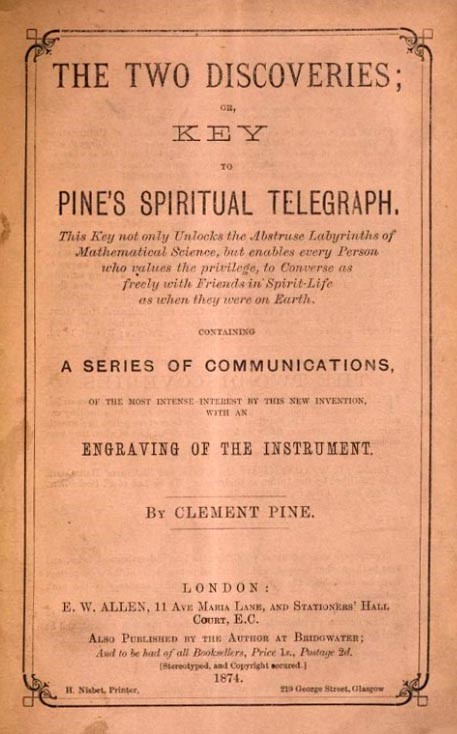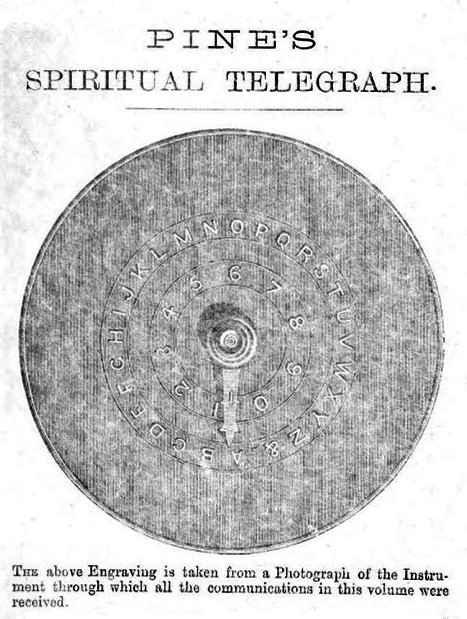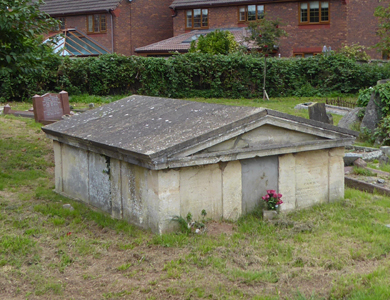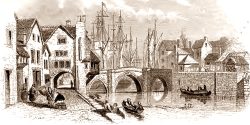Clement Pine was born in Bridgwater but emigrated in 1819 and spent most of his adult life in America. By 1869 his wife had died, his only child had entered a convent and he had lost his eyesight. Clement was elderly and alone, so he decided to return to Bridgwater.
Clement still had a sister and a sister-in-law living in Hamp, Bridgwater. Fortunately cataract surgery in November 1869 restored his vision. Once settled at ‘The Willows’ at Hamp, he began writing. ‘The Two Discoveries; or Key to Pine’s Spiritual Telegraph’ was published in 1874. [i] Clement had believed in Spiritualism since it became popular in America in 1848. In those sad, final years in America when he couldn’t see to read, Clement had a Ouija board, his Spiritual Telegraph, through which he believed he was speaking with deceased family and friends, the Spirits. He wrote his book in the format of transcriptions of those conversations. Through the Spirits he expressed views on many topics including religion, love and marriage. Clement also attempted to describe for his readers, many of whom would have been recently bereaved, what the Spirits experienced in the afterlife.


Many of the so-called spirits that he quotes, such as his wife and his father, are identified. There are others that he accuses of swindling or other dishonest practices which he reproaches but wisely does not identify.
In contrast to the rest of the book, his first chapter is autobiographical. When Clement writes of his miserable Atlantic crossing in 1819 with sea-sickness “being equal to half a dozen ordinary deaths”, every word rings true. Only after leaving Bristol did Clement discover that the old schooner had been condemned as unseaworthy. The voyage lasted nine weeks with storms and the threat of mutiny by the crew. Settling in Ohio, clearing his own land and building a log cabin was living the dream. Eventually Clement and his family moved into town and he reinvented himself as a newspaperman, postmaster, stationer and bookseller. He also lobbied politicians, practised magnetic healing and Spiritualism and travelled to other towns to hear social reformers and Spiritualists lecture. At least two of his letters to the editor have survived in print and other events can be verified by records in the archives, for instance his submission to Congress for cheaper postage. [ii]
From Hamp, Clement advertised his Spiritual Telegraph machines in several English newspapers, to provide himself with an income. He hoped his book would both instruct others in Spiritualism and also encourage sales. Newspaper reviews of The Two Discoveries were not always kind. One reviewer suggested that a little of the opinions of the ‘Spirits’ would go a very long way. [iii] Clement also wrote ‘Further researches in Mathematical Science’ and ‘What is Spirit?’ The latter was a small booklet, similar to the format in which ministers of the time printed notable sermons. This reviewer was kinder but succinct: “He has good intentions, but life, death and immortality cannot be summed up in seven pages.” [iv]
Clement died at Bridgwater on the 7th November 1875 and was buried in the Browne family vault, in the Dissenters’ section of Wembdon Road Cemetery.

A biography of Clement Pine, with a more detailed account of his life both in Bridgwater and in America, can be found on the website of the Friends of Wembdon Road Cemetery.
Jillian Trethewey, 26 January 2023
[i] Pine, Clement. The Two Discoveries; or Key to Pine’s Spiritual Telegraph. Published by E. W. Allen in London and by the author in Bridgwater. 1874.
[ii] The Congressional Globe, 20 Feb 1850 p394, column 3. Petition of Clement Pine and others of Ross County, Ohio, for cheaper postage.
[iii] The Examiner in the Ulverston Mirror and Furness Reflector – Ulverston, Lancashire, 31 Oct 1874
[iv] The Era Sun 3 Aug 1873 p12 Book Reviews. What is Spirit? By Clement Pine
